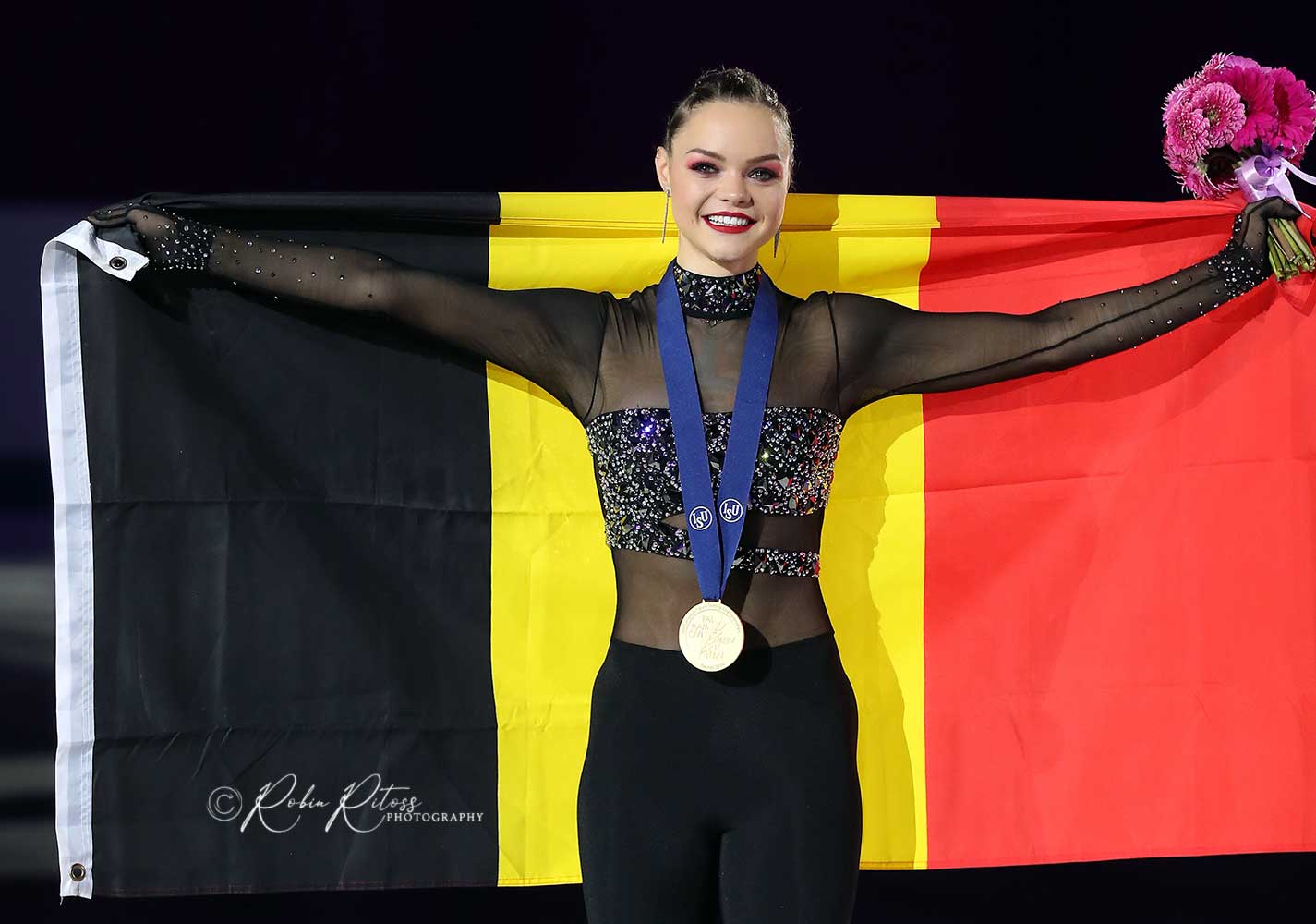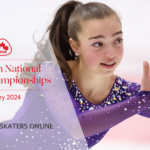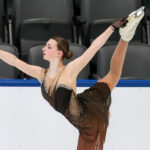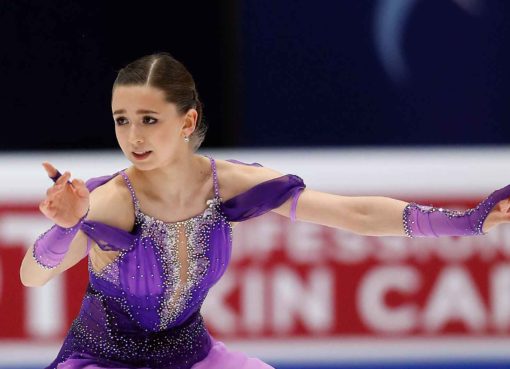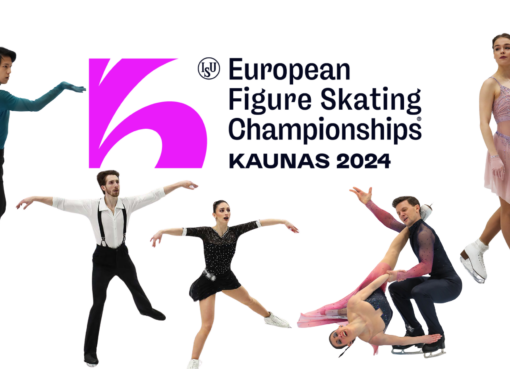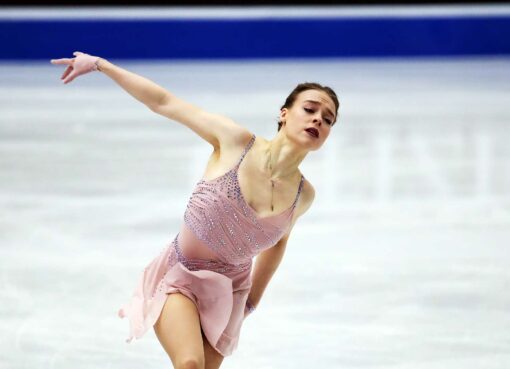By Gina Capellazzi, Team FSO website administrator
Photos by Robin Ritoss
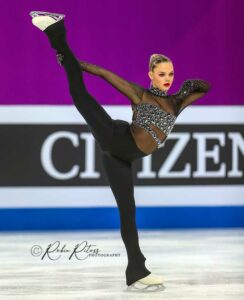 KAUNAS, LITHUANIA — At last year’s European Championships, Belgium’s Loena Hendrickx made history by winning the first European medal in the women’s event for Belgium. She won the silver medal. On Saturday in Kaunas, Lithuania, the 24-year-old made history once again, winning the first ISU European title for Belgium women and the first for Belgium since 1947 when the Belgium pairs’ team Micheline Lannoy and Pierre Baugniet won gold.
KAUNAS, LITHUANIA — At last year’s European Championships, Belgium’s Loena Hendrickx made history by winning the first European medal in the women’s event for Belgium. She won the silver medal. On Saturday in Kaunas, Lithuania, the 24-year-old made history once again, winning the first ISU European title for Belgium women and the first for Belgium since 1947 when the Belgium pairs’ team Micheline Lannoy and Pierre Baugniet won gold.
In first after the short program, Hendrickx skated first out of the top three in the free skate. She hit a triple Lutz-triple toe, triple flip and double Axel. Her only mistake was receiving an underrotation on her second triple flip. She earned a 138.59 in the free skate and a total score of 213.25 to win the event.
“I think it was one of the best competitions, because normally after the jumps I start enjoying, but it really felt that after the triple-triple I was relaxed. I know I can do better, but I’m super happy because I had so much fun on the ice. I never enjoyed a program as much as I did here,” Hendrickx shared.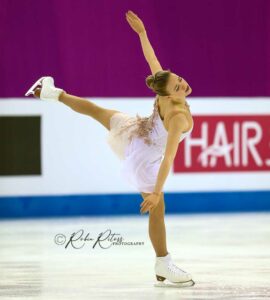
The 2023 European Champion Anastasiia Gubanova, of Georgia, was in third after the short program. Skating after Hendrickx in the free skate, the 21-year-old completed five clean triple jumps, including a triple flip-triple toe combination. Her triple Salchow and her triple Lutz in sequence with a double Axel were both called on the quarter. She achieved a new personal best score of 137.56, which was second in the free skate, and a total score of 206.52 to move up to second and earn her second consecutive European medal.
“I did all I planned. I’m just really happy,” she said following her skate.
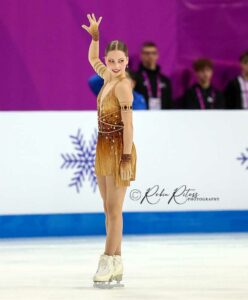 The final skater in the women’s event was Belgium’s Nina Pinzarrone, who was in second after the short program. In her free skate, the 17-year-old nailed a triple Salchow, triple loop-double toe combination and two double Axels. She had four triple jumps called on the quarter. She earned a free skate score of 132.59, which was third in the free skate, and an overall score of 202.29 to finish in third place and win the bronze medal.
The final skater in the women’s event was Belgium’s Nina Pinzarrone, who was in second after the short program. In her free skate, the 17-year-old nailed a triple Salchow, triple loop-double toe combination and two double Axels. She had four triple jumps called on the quarter. She earned a free skate score of 132.59, which was third in the free skate, and an overall score of 202.29 to finish in third place and win the bronze medal.
She earned her first ISU Championship medal in only her second appearance at Europeans.
“I’m super happy. It’s always a goal to medal at such an important competition. Just to stand here, it’s amazing. I had quite some nerves before. I had to skate last and it’s a long time waiting, but I knew I could do it, so I’m quite happy with my performances,” Pinzarrone told the media after her free skate.
Pinzarrone was also a part of history. The last time Belgium won more than one medal in a discipline at the European Championships was also 1947. When Lannoy and Baugniet won the gold, Suzanne Diskeuve and Edmond Verbustel won bronze in the pairs event when Lannoy and Baugniet won the title.
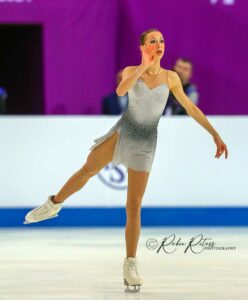 Switzerland’s Livia Kaiser, who was 18th at last year’s European Championships, was in fourth after the short program. The 19-year-old held onto the fourth place with personal best scores for both the free skate (128.41) and overall score (194.72).
Switzerland’s Livia Kaiser, who was 18th at last year’s European Championships, was in fourth after the short program. The 19-year-old held onto the fourth place with personal best scores for both the free skate (128.41) and overall score (194.72).
“I’m very happy,” she said.
In sixth after the short program was France’s Lorine Schild, who was making her European Championships debut. In the free skate, she earned a score of 120.59, which was sixth in the free skate, but was able to finish in fifth overall with a score of 183.86.
“I’m very happy, especially because I made it not even into top 10, but better than that (top 6), so of course, I’m very happy,” the 19-year-old said.
The newly crowned Italian champion Sarina Joos pulled up from ninth after the short program to finish in sixth overall (180.83) in her European Championships debut.
“I’m really grateful. I’m really happy. I have a lot of emotions right now. I’m just so happy that I could show that free program,” the 17-year-old exclaimed.
2023 European bronze medalist Kimmy Repond, of Switzerland, finished seventh with 180.82 points. Olga Mikutina, of Austria, who was in fifth after the short program, dropped to eighth place overall.
Men
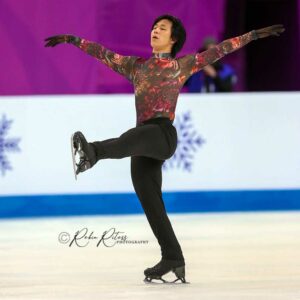 Like the women’s event, the men’s event also saw some history as France’s Adam Siao Him Fa won his second consecutive ISU European Championships. He became the first French skater to retain the European title since Alain Calmat (1962-1964).
Like the women’s event, the men’s event also saw some history as France’s Adam Siao Him Fa won his second consecutive ISU European Championships. He became the first French skater to retain the European title since Alain Calmat (1962-1964).
In first after the short program, Siao Him Fa kicked off his free skate with a quadruple Lutz, but then fell on his quadruple toe attempt. He managed to bring the program back together by executing a triple Axel-double Axel sequence, quadruple Salchow, quadruple toe-triple toe combination, as well as two more triple jumps. Siao Him Fa surprised the audience and the judges when he included a back flip in his choreographic sequence, which is an illegal element. That cost him a two-point deduction. He earned a free skate score of 182.04 and a total score of 276.17 to defend his title.
“I was feeling really good when I arrived at the rink and in the warm-up. I felt kind of shaky when I came back on the ice, but I was confident with myself and I fought until the end of the program. It was really fun to skate tonight in Kaunas and I really enjoyed it even if it wasn’t perfect,” he said after his free skate.
“It takes more energy to do it in the free program than in the exhibition, but I felt good and I had the energy to do it and I wanted to perform it for the audiene even in the compeition. I enjoyed doing it. If I would make more mistakes in the program, I wouldn’t do it,” the 22-year-old added about the decision to do the back flip. ”
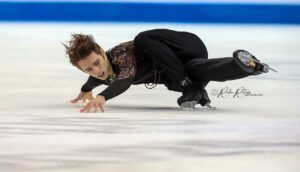 Siao Him Fa wasn’t the only one making history in the men’s event. Aleksandr Selevko made figure skating history for Estonia, winning the first ever European Championships medal for his country.
Siao Him Fa wasn’t the only one making history in the men’s event. Aleksandr Selevko made figure skating history for Estonia, winning the first ever European Championships medal for his country.
In third after the short program, the 22-year-old opened his free skate with a quadruple toe and then completed six triple jumps, including a triple Axel-triple toe combination and a triple Lutz-double Axel-double toe sequence. He earned a personal best score of 166.94, which was third in the free skate. He earned a total score of 256.99, also a personal best score to move up to second place and claim the silver medal.
“I tried to do my best today. I did have a good skate, but not clean, my second triple Axel was not a success (he doubled), but I’m really happy today,” he shared after his free skate.
“I don’t know how I feel. I don’t know what did I do, but I’m really happy. It’s a big thing for me,” Selevko added about making history for Estonia.
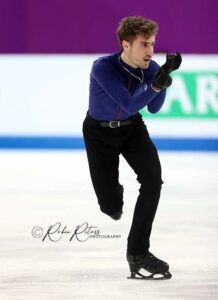 Italy’s Matteo Rizzo was in sixth after the short program. He had an almost clean free skate, which included a quadruple toe, triple Lutz-triple toe and triple flip-Euler-triple Salchow combinations, and a triple Axel-double Axel sequence. His only mistake came at the end of the program when he fell on his second triple Axel, which was also called on the quarter. He earned a free skate score of 170.44, which was second in the free skate. He jumped up to finish in third place (250.87) and claim the bronze medal, his third European Championship medal.
Italy’s Matteo Rizzo was in sixth after the short program. He had an almost clean free skate, which included a quadruple toe, triple Lutz-triple toe and triple flip-Euler-triple Salchow combinations, and a triple Axel-double Axel sequence. His only mistake came at the end of the program when he fell on his second triple Axel, which was also called on the quarter. He earned a free skate score of 170.44, which was second in the free skate. He jumped up to finish in third place (250.87) and claim the bronze medal, his third European Championship medal.
“I’m happy with the result of today. I just really had a couple of weeks of practice before so I’m happy overall,” Rizzo said after his skate.
The European Championships marked Rizzo’s last event of the season. Just a few weeks ago, he withdrew from Italian Nationals due to a right hip injury. The doctors told him he could compete at the European Championships, but then he would need to have surgery, which will keep him off the ice for five to six months.
“It’s a long break,” he said. “I’ll be back next year.”
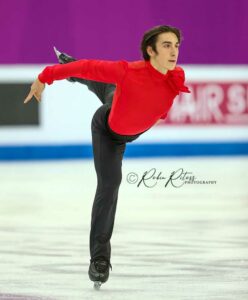 Rizzo’s fellow teammate, Gabriele Frangipani, who won the silver medal at Italian Nationals in December, remained in fourth place with a free skate score of 162.58 and an overall score of 246.09. This was his best placement of his four European Championships.
Rizzo’s fellow teammate, Gabriele Frangipani, who won the silver medal at Italian Nationals in December, remained in fourth place with a free skate score of 162.58 and an overall score of 246.09. This was his best placement of his four European Championships.
2023 European bronze medalist Lukas Britschgi, of Switzerland, who was in second after the short program, made some uncharacteristic mistakes in the free skate. He earned a free skate score of 151.29, which was 10th in the free skate. He dropped to fifth overall with a free skate score of 242.46.
“I’m really disappointed that I couldn’t show what I could show on Wednesday, or in general,” he said after the free skate. “But that is competition, that’s life sometimes.”
2022 European bronze medalist Deniss Vasiljevs, of Latvia, who was in fifth after the short program, rounded out the top six with 237.42 points.
Pairs
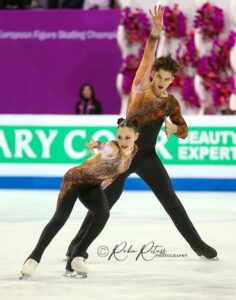 The pairs event was a turbulent one with reigning European Champions Sara Conti and Niccolo Macii, of Italy, finding themselves sitting in seventh place after the short program. It was their teammates Lucrezia Beccari and Matteo Guarise, who only started competing together last season, that took home the title.
The pairs event was a turbulent one with reigning European Champions Sara Conti and Niccolo Macii, of Italy, finding themselves sitting in seventh place after the short program. It was their teammates Lucrezia Beccari and Matteo Guarise, who only started competing together last season, that took home the title.
In third after the short program, Beccari and Guarise opened their free skate with a triple twist, followed by a triple Salchow, throw triple loop and Salchow. Their only mistake was an underrotation on their triple toe-single Axel-double Axel sequence. They earned a free skate score of 132.14, which was a personal best score, and a total score of 199.19 to move up from third place to win the gold medal.
Guarise had previously competed with Nicole Della Monica. The gold medal with Beccari marked Guarise’ first medal in his tenth appearance at Europeans.
“We worked so hard for this result,” said Guarise. “It’s really amazing you know. I really wanted it. Yesterday in the press conference, with the small medal that I already had had before, I said I want to go home with another hone. It was so hard this time, but we really want it, we work so hard and the result is coming out and we are very happy.”
“I’m very happy,” Beccari added. “I’m very happy first for our performance because we did what we know we can do and of course, I’m really happy for the medal because it’s my first important medal. I’m very happy and excited.”
The winners of the short program was the new team Anastasiia Metelkina and Luka Berulava, of Georgia, who competed on the Junior Grand Prix this season and won the Junior Grand Prix Final. In the free skate, Metelkina fell on the side-by-side triple Salchow, but the team did complete a throw triple flip and loop. They earned a free skate score of 124.84, which was fifth in the free skate, which cost them the gold medal. They won the silver medal with a score of 196.14.
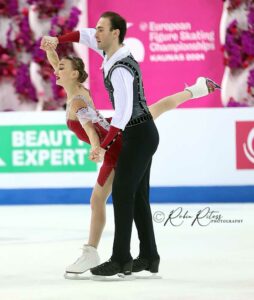 “We did not expect this outcome,” Berulava said. “But this is sport and we will continue to work hard. This is only our first season and you can’t have everything right away.”
“We did not expect this outcome,” Berulava said. “But this is sport and we will continue to work hard. This is only our first season and you can’t have everything right away.”
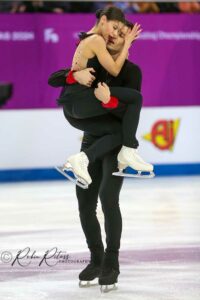 2023 European silver medalists Rebecca Ghilardi and Filippo Ambrosini, who were in fifth place after the short program, delivered one of their best free skates. It featured side-by-side double Axel-double Axel-single Axel sequence and throw triple Lutz and loop. Their only mistake was their side-by-side triple Salchow was called on the quarter. They earned a personal best free skate score of 130.81, which was second in the free skate and moved up to third place with a total score of 195.68.
2023 European silver medalists Rebecca Ghilardi and Filippo Ambrosini, who were in fifth place after the short program, delivered one of their best free skates. It featured side-by-side double Axel-double Axel-single Axel sequence and throw triple Lutz and loop. Their only mistake was their side-by-side triple Salchow was called on the quarter. They earned a personal best free skate score of 130.81, which was second in the free skate and moved up to third place with a total score of 195.68.
“We are very happy,” Ghilardi shared. “We finally see our work paying off so it’s amazing.”
“We enjoyed our performance tonight,” Ambrosini added.
Hungary’s Maria Pavlova and Alexei Sviatchenko finished third in the free skate, but remained in fourth place overall with 194.02 points.
“We are happy,” Pavlova said following the free skate. “We have done everything we could. I can see that we got lower levels on some elements, unfortunately, but we really did our best.”
ISU Grand Prix Final Champions Minerva Fabienne Hase and Nikita Volodin, of Germany, who were in second after the short program, had a tough free skate. They missed the throw loop and had to abort a lift, which cost them a medal. They finished in fifth place with 190.69 points.
“We’re obviously not happy at all with the skate,” Hase admitted. “Before we felt pretty good in this skate. I don’t know what happened, we have to look over it now and in the next days, let the feeling sink a little bit because right now we are disappointed. We really wanted to medal here and we have’t medaled at all, which is kind of tough.”
Conti and Macii finished in sixth place with 187.25 points.
Dance
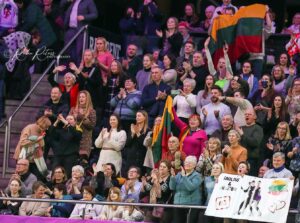 Italy’s Charlene Guignard and Marco Fabbri kept their European ice dance title, with Great Britain’s Lilah Fear and Lewis Gibson repeating as silver medalists. The highlight of the ice dance event was when Lithuania’s Allison Reed and Saulius Ambruvelicius took the ice in front of a home crowd of 11,000 spectators. They took home the bronze medal, the first European medal for Lithuania since 2006 when Margarita Drobiazko and Povilas Vanagas had also taken the bronze.
Italy’s Charlene Guignard and Marco Fabbri kept their European ice dance title, with Great Britain’s Lilah Fear and Lewis Gibson repeating as silver medalists. The highlight of the ice dance event was when Lithuania’s Allison Reed and Saulius Ambruvelicius took the ice in front of a home crowd of 11,000 spectators. They took home the bronze medal, the first European medal for Lithuania since 2006 when Margarita Drobiazko and Povilas Vanagas had also taken the bronze.
Read more about the ice dance event at Ice-Dance.com.


